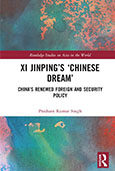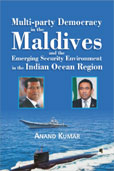Xi Jinping’s ‘Chinese Dream’: China’s Renewed Foreign and Security Policy
- Publisher: Routledge Taylor & Francis
The author analyses the influence of Xi’s 'Chinese Dream' on China’s foreign relations and security postures.
Xi Jinping’s rise has led to a paradigm shift in many aspects of China’s domestic and international politics. A key element of this has been the ideological vision shorthanded as the 'Chinese Dream', combining elements of nationalism, Confucian ideology, and economic expansionism. Singh evaluates the various changes in China’s nominally communist ideology in the post-Mao era, with an emphasis on the implications for China’s economic and security relations with other countries. He particularly focusses on China’s approach to South Asia and the Indian Ocean Region, key elements of China’s strategy.
An insightful guide to understanding the direction of China’s foreign and security policy, and especially its impact on India–China relations.
- ISBN: 9781032375328 ,
- Price: £84.00
- Prashant Kumar Singh
- 2022 |
- Book
- |






